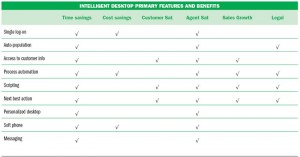Intelligent Desktops

Over the past two decades, contact centers have made extensive investments with the aim of improving productivity and enhancing the customer experience. Good intentions notwithstanding, according to surveys, caller satisfaction with contact center interactions scores at best a gentleman’s “C.” While there are many potential reasons for this disquieting outcome, certainly growing complexity has to be one of them. As self-service siphons off the “easy” calls, agents are left to deal with the more challenging situations. Having prepped themselves by visiting informative websites and corresponding with real and virtual communities, consumers are loaded for bear. The longer they are on hold, the more questions they can think of asking.
In most cases, agents have access to the information they need. But too often it is sequestered in siloed applications and data marts. The caller waits impatiently while the agent logs in and out of different applications, consults personal files, calls subject-matter experts, accesses web pages, and experiments with hand-crafted shortcuts.
What Is an “Intelligent Desktop”?
It was for situations like this that the notion of the intelligent desktop was hatched. These devices are variously called “smart agents,” “intelligent desktops,” “universal desktops” and “unified desktops.” There is no generic term and there are nuanced differences between “intelligent” and “unified” desktops. However, all these products have the same core function—to condense required call processing information onto a single desktop application and organize the sequencing of screens to coincide with workflow. For ease of communication we will use the term “intelligent desktops.” Think of them as the Swiss army knives of the contact center. They provide access to multiple tools all in one place. What distinguishes intelligent desktops from software that aims to provide similar benefits, such as performance management, is the way they communicate with databases. The methods are characterized as non-evasive. Intelligent desktops operate at the presentation layer. The technology does not require separate APIs to communicate with disparate devices and applications and, therefore, are quick and easy to install. The precise method of data transfer constitutes the secret sauce of the different vendors
Who Are the Players?
Early movers in this space were two Israel-based companies, eGlue and Jacada. eGlue was a pioneer in screen-scraping technology. The company was acquired by NICE Systems in July 2010. Jacada was founded in Israel in 1990 and launched their first unified desktop product in 2004. Jacada has major operations in the Atlanta area.
Leading vendors today include, in alphabetical order:
- Altitude Software
- Amdocs
- Cincom systems
- Cicero
- Jacada
- KANA Software
- Open Span
- Upstream works
The former marketshare leader in the space, Merced Systems, was acquired by NICE Systems in February 2012 for $150 million. In addition to the above, several WFO vendors and some call server makers provide intelligent desktop functionality. We are limiting this discussion to standalone nonproprietary solutions.
Why Would a Contact Center Want One?
The original raison d’être for intelligent desktops was to help frustrated contact center agents who had to navigate up to 30 different applications to answer a query or process a transaction. The intelligent desktop consolidated data from multiple sources into condensed views tailored to the needs of the organization. The functionality and benefits now go far beyond this basic requirement. The matrix on page 22 shows the primary features and benefits. The level of functionality varies by vendor.

TIME SAVINGS
Intelligent desktops free agents from mundane and repetitive tasks like logging in and out of applications and updating databases. The applications also save time by simplifying and standardizing business processes. Recent innovations include tools that automatically guide the agent to the next best action for that particular consumer.
COST SAVINGS
Vendors are quick to point out substantial financial benefits from reduced handle time. Amdocs claims in their promotional literature that customers can expect handle times to decline by as much as 40%. This translates directly into substantial labor savings and reduced demand on network resources. Another significant source of cost savings is reduced training time. Agents have to learn fewer applications and fewer processes.
CUSTOMER SATISFACTION
The most significant customer care benefit is higher first-call resolution rates. FCR is one of only two metrics that have been empirically shown to directly relate to customer satisfaction. Intelligent desktops reduce the incidence of second and third calls by addressing the root causes. Two of the most important reasons for repeat calls are lack of information and lack of authority. Intelligent desktops present essential information about the customer’s contact history and provide quick access to other databases. Agents can also get immediate assistance from onscreen knowledge bases and communication links to subjectmatter experts. Finally, the internal messaging features make it easier to secure supervisor authorizations. Pelorus research shows that, by reducing the number of repeat calls by only 5 percentage points, from 25% to 20%, an inbound contact center with 250 agents can save approximately $230,000 annually.
AGENT SATISFACTION
Every year, thousands of customer service agents leave the occupation more out of boredom than lack of advancement opportunities. The work is repetitious and they spend way too much time on mundane tasks. Intelligent desktops provide a centralized source for securing the information they need when they need it, helps to reduce errors and mistakes through process automation, and some applications even allow agents to personalize their desktops. The agent can spend more time doing what they really want to do—pleasing customers.
REVENUE GROWTH
Outbound telemarketers or inbound agents executing upsells benefit from the sequenced presentation of key selling points and prepared scripts. The “next best action” guidance feature helps speed the buying process while giving customers confidence that they are making the best choice.
LEGAL COMPLIANCE
Scripting tools help to ensure that agents provide the required disclosures. Process automation means that required steps are not missed. Some intelligent desktop tools include auto population, which not only reduces handle time, but helps to ensure that data is entered accurately.
So What’s Next?
Demand for intelligent desktop applications is very healthy. Besides the significant benefits that we have outlined, we are seeing trends that will continue to stimulate growth in this space. One is movement toward cloud distribution. The cloud is an ideal model for reaching contact center customers, as the applications are generally ACD agnostic, do not require onsite software or hardware, and are useful for contact centers of all sizes. Another important trend is expanding functionality to encompass the complete customer journey, from initial inquiry to product or service fulfillment. A good example is OpenSpan Activity Intelligence, a new SaaS-based solution designed to provide actionable insight into interaction business intelligence, worker activity, process flows and technology diagnostics. Quoting from their press release, “OpenSpan Activity Intelligence brings a strategic lens to contact center and front- and backoffice leaders, delivering next-generation advanced correlation capabilities including outcome analyses that uncover key behaviors, processes or activities that result in gold-standard service experiences.”
Dick Bucci is Chief Analyst at Pelorus Associates, which provides market research and consulting services to the contact center industry.
– Reprinted with permission from Contact Center Pipeline, www.contactcenterpipeline.com




